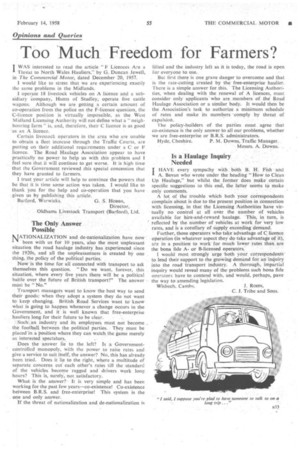Too Much Freedom for Farmers?
Page 67

If you've noticed an error in this article please click here to report it so we can fix it.
I WAS interested to read the article "F Licences Are a Threat to North Wales Hauliers," by G. Duncan Jewell, in The Commercial Motor, dated December 20, 1957.
I would like to stress that we are experiencing exactly the same problems in the Midlands.
I operate 18 livestock vehicles on A licence and a subsidiary company, Hunts of Studley, operate five cattle wagons. Although we are getting a •certain amount of co-operation from the police on the F-licence question, the C-licence position is virtually impossible, as the West Midland Licensing Authority will not define what a neighbouring farm" is, and, therefore, their C licence is as good as an A licence.
Certain livestock operators in the area who are unable to obtain a fleet increase through the Traffic Courts, are putting on their additional requirements under a C or F licence. The Road Haulage Association appear to have practically no power to help us with this problem and I feel sure that it will continue to get worse. It is high time that the Government reviewed this special concession that they have granted to farmers.
I trust your article will help to convince the powers that be that it is time some action was taken. I would like to thank You for the help and co-operation that you have . given us by publishing this article.
Barford, Warwicks. G.. S. HOBBS,
Director, Oldharns Livestock Transport (Barford), Ltd. .
The Only Answer Possible
MATIONALIZATION and de-nationalization have now been with us for 10 years, also the most unpleasant situation the road. haulage industry has experienced since the 1920s, and all the unpleasantness is created by one thing, the policy of the political parties. Now is the time for all connected with transport to ask themselves this question. "Do we want, forever, this situation, where every five years there will be a political battle over the future of British transport?" The answer must be "No."
Transport managers want to know the best way to send their goods; when they adopt a system they do not want to keep changing. British Road Services want to know what is going to happen whenever a change occurs in the Government, and it is well known that free-enterprise hauliers long for their future to be clear.
Such an industry and its employees must not become , the football between the political parties. They must be placed'in a position where they can watch the game merely as interested spectators.
Does the answer lie to the left? Is a Governmentcontrolled monopoly, with the power to raise rates and give a service to suit itself, the answer? No, this has already been tried. Does it Ii,e to the right, where a multitude of separate concerns cut each other's rates till the standard of the vehicles become ragged and drivers work lone hours? This is, surely, not satisfactory.
What is the answer? It is very simple and has been working for the past few years—co-existence! Co-existence between B.R.S. and free-enterprise! This system is the one and only answer. If the threat of nationalization and de-nationalization is 'lifted and the industry left as it is today, the road is open for everyone to use.
. But first there is one grave danger to overcome and that is the rate-cutting created by the free-enterprise haulier. There is a simple answer for this.. The Licensing Authorities, when dealing with the renewal of A licences, must consider only applicants who are .members of...the Road Haulage Association or a similar body. It would then be the Association's task to authorize a minimum schedule of rates and make its members -comply by threat of expulsion. The policy-builders of the parties must. agree that co-existence is the only answer to all our problems, whether we are free-enterprise or B.R.S. administrators.
Hyde, Cheshire. P. M. Downs, Traffic Manager.
Messrs. A. Downs. .
Is a Haulage Inquiry Needed
I HAVE every sympathy with bcith B. R Fish and A. Bevan who wrote under the heading "How to Clean Up Haulage," but . whilst the former, does make certain specific suggestions to this end, the latter seems to make only comments.
A lot of the trouble which both your correspondents complain about is due to the present position in connection with licensing, in that the Licensing Authorities lave virtually no control at all over the number of vehicles available for hire-and-reward haulage. This in turn, is reflected by the number of vehicles at work for very low rates, and is a corollary of supply exceeding demand.
Further, those operators who take advantage of C licence operation (in whatever aspect they do take advantage of it), are in a position to work for much lower rates than. are the bona fide Aor B-licensed operators. I would most strongly urge both your correspondents to lend their support to the growing demand for an inquiry into the road transport industry. A thorough, impartial inquiry would reveal many of the problems such bona fide operators have to contend with, and would, perhaps, pave the way to amending legislation.
Wisbeeh. Cambs. J. ROHN,
C. J. Tribe and Sons.




















































































































